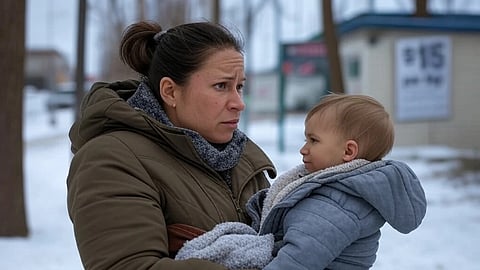

Many Alberta families will soon see a reduction in childcare expenses as the province introduces a new flat fee of $15 per day for full-time licensed daycare and family day home programs — but others complain of rising costs.
Announced on Jan. 30 by Jobs, Economy and Trade Minister Matt Jones, the policy sets a monthly rate of $326.25, effective April 1, as part of the ongoing $3.8-billion Canada-Alberta Canada-Wide Early Learning and Child Care Agreement.
"This is a huge win for parents — an 80% reduction in childcare," said Jones in a media scrum Thursday.
Although the move brings Alberta closer to the promised $10-a-day childcare by 2026, it has sparked both praise and concern amid an already contentious debate. The flat fee replaces a patchwork of reduced rates that varied by provider and age group, aiming to simplify billing and ensure predictability for parents.
Since the federal-provincial deal was signed in November 2021, fees have dropped incrementally — down to an average of $15 per day province-wide by January 2024 from highs of over $1,000 monthly in 2019, according to the province and pre-deal surveys.
Jones lauded the latest step as "a milestone in affordability," noting Alberta has added 25,000 childcare spaces since 2021, with a goal of 68,700 by 2026.
"This is about giving families certainty and supporting working parents," he said at the January announcement.
In Thursday's scrum, he added, "This agreement is short about $5 billion over the next five years. So we're not in a position to stack the former legacy subsidy, which was about $100 a month to $206 a month, with the current affordability funding, which is about $900 a month that we provide to offset the cost of childcare. So we're not in a position to make it lower — if we could we would."
The Association of Alberta Childcare Entrepreneurs (AACE) warns the flat fee could exacerbate financial strain on operators — one of whom cautioned the Western Standard about "less food" for children.
Others will have fewer operating hours.
"We will be closing at 5:30 p.m. every day starting April 1," said Calgary's Willowbrae Academy in a statement sent to parents. "A reminder that a late pick-up fee will be charged for each minute after 5:30, and repeated late pick-ups of your child may result in the termination of care."
AACE chairperson Krystal Churcher, who has long criticized the funding model, reiterated concerns from a January 2024 protest.
"The grants don't cover rising costs, and delays in reimbursement force us into debt."
Although the province adjusted payments last year — offering 80% of grants upfront — AACE argues the $15 rate still falls short of operational realities, risking closures.
In Calgary, daycare owner Sarah Hunter echoed this, telling reporters, "We're cutting corners to survive, and parents notice."
Parents are divided. Edmonton mother Lisa Tran welcomed the flat fee, saying, "It's one less variable to worry about," reported CTV.
Yet rural families report dwindling licensed options, forcing reliance on pricier or unregulated care.
Jones plans to push Ottawa for more flexibility.
"So, what Alberta is advocating for is that today, $15 a day or 2026, $10 a day would be reserved for low income Alberta households," he said in Thursday's media scrum. "And we're all ears as to what the federal government would define as low income households."
According to the Edmonton Journal, Alberta Premier Danielle Smith's office received dozens of notes from concerned parents about the new fee system.
"In the emails, parents reported forthcoming increases of as much as $650 per month, or $7,800 per year, under the flat rate," wrote the Journal.
"The axing of this program is going to ruin any chance I have of staying afloat in today's economy," reads one note.
"I'm left with $400 a month once I pay my rent, car insurance, and before I buy groceries and necessities for my children," reads another.
